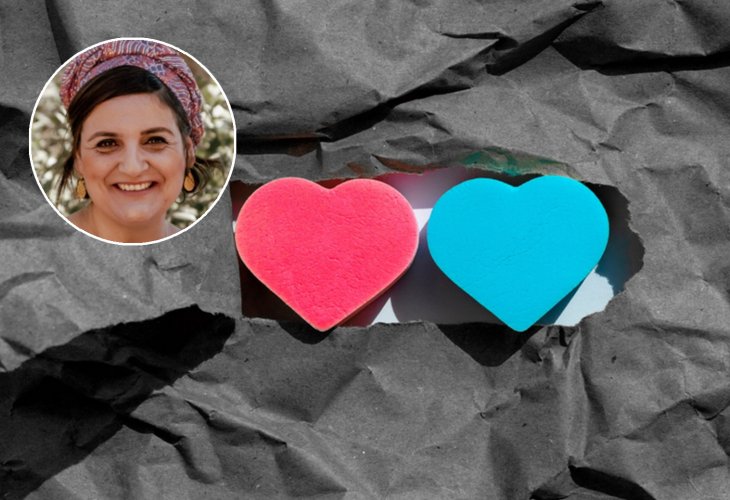Racheli Huminer: "I Feel a Calling to Match Terror Victims, It's My Mission"
Against all odds: moving past trauma to marriage, a matchmaking without ever meeting the groom, and the personal loss that changed her life. Racheli Huminer shares her journey.
 In the circle: Racheli Huminer (Photo: shutterstock)
In the circle: Racheli Huminer (Photo: shutterstock)It happened a decade ago, and nothing prepared her for the moment that changed her life in an instant. Racheli Huminer was starting another routine morning when she suddenly received a call from her sister, screaming two words down the line: "Odelia was killed".
"I had a younger sister named Odelia Finkler z"l, who was a mother to two little ones," Huminer recounts, "One of them was a four-month-old baby and the other was a three-year-old boy. She was supposed to celebrate her 30th birthday right after we got up from the shiva, and she was killed in a car accident on her way to work. Just like that, in the middle of life, with no warning. It was utterly tragic".
Huminer, now a professional matchmaker and founder of the 'Habe'er' matchmaking website, decided to take up the challenge in her sister's memory: "The subject of matchmaking was very close to her heart, and she was very involved in it. Just a few days before she was killed, she made a match. Since then, I continue to see it as a blessing".
Incidentally, Huminer, a resident of Ma'ale Gilboa, has her unique motherhood story: she is a mother of six children from three births. No, she doesn't have three sets of twins: she is the biological mother of twin girls and two other daughters, and together with her husband decided to adopt another daughter, as well as a baby who joined the family about half a year ago.
Until the COVID-19 pandemic, Huminer worked in various professions: she worked at a community center company, was also a parenting coach, a graphologist, and specialized in group facilitation. Today, she defines her occupation as "a matchmaker at heart and soul".
"I wasn’t always an official matchmaker," she describes. "My life story began at a young age with this, out of a desire that no one should be alone. During COVID, I was put on forced leave from my job at the community center company, and when they wanted me to return, even offering me a promotion, I had already re-evaluated, which led to a big change, and I decided to leave everything and focus only on matchmaking. I vividly remember that day after much deliberation, setting out on a new path with all that it entails, even at the risk of livelihood. But the understanding was strong: this is what’s needed now, and messengers of a mitzvah will not suffer harm. Today, I also give lectures across the country on this topic, to parents of those seeking partners, therapists, coaches, hold personal meetings, workshops, and more.
 (Photo: shutterstock)
(Photo: shutterstock)Within the matchmaking story, Racheli has a special connection to a very sensitive and unconventional field: matchmaking for terror victims: "Over time, I discovered that I connect more with the stories of widowers and widows, and I have had the privilege to match quite a few such couples. I think there is some kind of mission here, some interest, I can't fully explain it, there was even a rabbi who once told me that. It always intrigued and interested me".
How did you come to match terror victims specifically?
"My journey with them began with working with widowers and widows, initially I dealt with stories of IDF widows. One must understand there is a big difference between loss due to illness and loss due to terror. In illness, there is usually a farewell time, and often a sense of relief, especially when dealing with someone who was sick for a long time and was relieved of suffering. In many cases, he even left behind some sort of testament to the partner to move on and marry, sometimes even recommending a specific person.
"In contrast, when it comes to terror – it's sudden, unplanned, no goodbyes. It is very abrupt, as it was with my sister, and the trauma is often much harsher. It is hard to detach from an illness, but from terror, which is 'national tragedies', one wants to rise from mourning, from the ashes, elevate, as the verse says 'And I said to you, live by your blood', and move forward. Even though I also see a difference between widowers and widows: many widowers who approached me want to move forward, unlike widows, for whom it is usually more difficult.
Do you remember a particularly moving matchmaking story you had the privilege to make?
"Yes, the story of Efraim Rimel and Ayelet Kolman. Efraim is a dear and special man, truly a personality. Currently disabled in a wheelchair, due to a car accident, where his wife and three-week-old daughter were killed on the spot, and he was miraculously saved. Ayelet, she is also such a special and brave woman, a terror widow whose husband Adiel was murdered five years ago. I had never seen Efraim or spoken to him before, I only heard about him from someone who was in his lecture, how special he is, and somehow it materialized. Each of them is a widower with children, and they chose to unite two homes. It was one of the most emotional weddings I've ever been to in my life, I felt it was like Mount Sinai moment.
Do you also encounter humor amidst all the grief?
"Yes, once I suggested a match to a guy of a certain girl, and I sent him a picture I got from her, in which she appears with a friend, and he thought it was her. Even when I explained I meant the other girl, he insisted on meeting the friend in the picture, and they actually got married," she laughs.
Is matching terror victims different from any other matchmaking?
"It is very different to match widowers than divorcees or singles, for instance, because widowers did not choose this, it is a situation that happened to them unwillingly, and traumatically. Then one needs to overcome the longing, the absence, and the pain.
"Widowers, particularly those affected by terror, everyone has a different way and pace of dealing, as it meets each one in a different place. There is, for instance, a widow I know who finds it hard to move on even after years, and there are those who remarried even within the year of the death or the following year. What they all have in common is that they did not choose this, hence it is a much more traumatic experience.
"After terror or bereavement people usually want to move forward, and there are even cases, particularly in our country, of an unspoken or spoken will. Like the widower who shared that his wife told him, shortly before she was unexpectedly killed, to move on if anything happens to her. I hear it often, even men who went to war, leaving behind a written or spoken, hinted or not hinted will.
Has the family of a deceased ever been upset at you for matching someone new with the spouse?
"Certainly. For instance, there was a case where a widower wanted to start dating six months later, and when I called him, we talked, and I suggested someone to him. They dated for several months and decided to marry. The family of the deceased wife asked him how they met, and he said through me, and they were very upset with me. Instead of rejoicing, they saw me as the villainous woman who took him out of it, thinking that had I not suggested, he wouldn't remarry now.
"But I see it differently. It's clear to me that if not me – then someone else would have suggested, and that’s what should have happened. Even sisters of the deceased, or her children, who felt as if I 'brought' a new and foreign mother into their home, replacing the beloved mother they had. On the other hand, there are those who are very supportive and appreciative.
As a terror victim, is it harder to make the decision to remarry?
"Absolutely. Because this decision involves children, and in many cases it also involves combining homes, and it is a second time deciding to marry. The first time it was from a naive and young place, and suddenly we've passed a few years and understand what a wedding means, for better or worse, and then people hesitate. Surprisingly, the consultations and hesitations come more from men. Maybe because women have more support or therapy and find someone to talk to, and the man has no one to talk to and sees me as a contact point.
Do you always match terror victims only with terror victims, or widowers with widowers?
"No, but for example, divorcees often want to date widowers because they understand what divorce means for better and worse. But widowers want to date other widowers. Why? Because they understand each other best, it's the same language and the same world of concepts. Even a widower who lost his wife wants to date a woman who doesn't have another man in the background. There is something total here, the deceased spouse is always in the background, but not in the forefront, not in events, he does not share in decision-making. Even divorcees prefer a single woman or a widow. Incidentally, older single women prefer widowers more, because they perceive him as someone who experienced a relationship, stable, without custody and court disputes, his wife passed away unwillingly, and he wants to move forward.
"One must also understand that the bereavement experience very much connects widowers over bereavement or terror. They do not need to speak much, they understand each other without telling. They both sat shiva, they both experienced trauma, they both raised children who need care and mending the shattered pieces, suddenly having to grow a home alone, as if the Shabbat before that they were still celebrating together. They both suddenly fell into a black hole in the middle of life, without warning. They also have a black humor reserved for them, or types of responses reserved only for them. These very sharp life transitions are something only widowers, like terror widowers or IDF widowers, can understand in such a way.
How do you cope with all the pain you encounter along the way?
"The truth is that most often I meet with strong people, who manage to build new, happy, and full homes. It is written that 'the latter house will be greater than the former one', and I believe in this and in the ability of people to create it, even from the ruins. I always keep in mind that there is divine management here, there is a continuation we do not see immediately. We remain in bereavement, but when a person has the opportunity to continue and set up a home with someone new, it is amazing, and nothing brings me more joy than being that messenger."
Racheli Huminer was a guest on the program "It's Not Taken for Granted", hosted by Moran Kurs. The full interview will be published soon.

